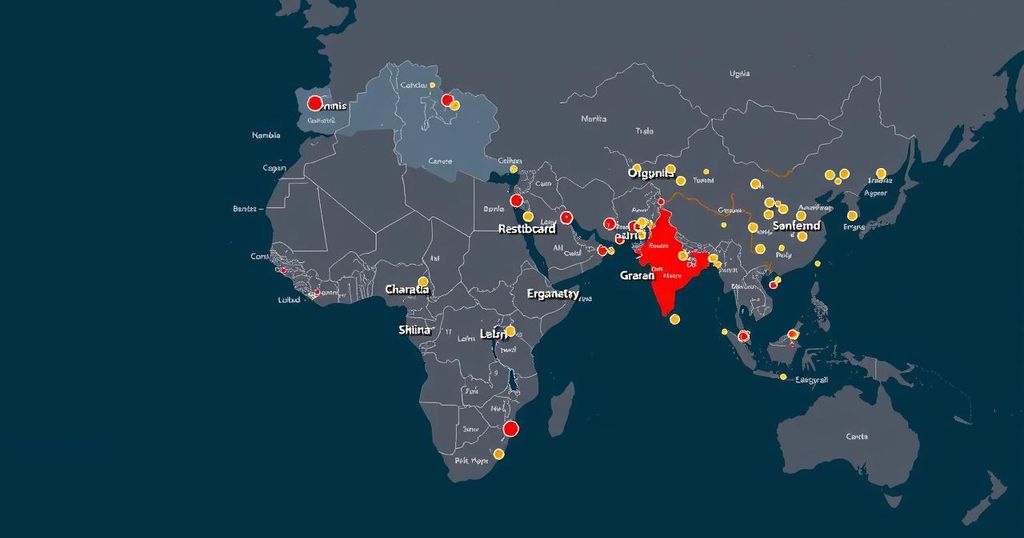Namibia’s Election: A Defining Moment for SWAPO Amidst Youth Discontent

Namibia’s upcoming election on Wednesday poses a critical challenge for the ruling SWAPO party amid youth discontent regarding economic conditions. High unemployment, corruption, and a severe housing crisis undermine SWAPO’s popular support, especially among young voters who represent over 40% of registered voters. This election could either result in Namibia’s first female president or signify a political shift to opposition leadership.
On Wednesday, Namibians will cast their votes in what is anticipated to be a significant electoral challenge for the South West Africa People’s Organization (SWAPO), a party that has governed since the nation achieved independence in 1990. This election occurs against a backdrop of increasing discontent among the populace due to high unemployment rates, pervasive government corruption, a pressing housing crisis, and declining social conditions. SWAPO’s popularity has waned as the youth demographic, which constitutes over 40 percent of registered voters, seeks change away from the nostalgic narratives surrounding liberation movements.
Previous elections in southern African nations have revealed a troubling trend for liberation parties, evident in the recent losses suffered by the African National Congress in South Africa and the Botswana Democratic Party, given their historical governance. Although SWAPO may still secure a substantial number of votes, analysts note that the party must engage with the youth effectively to maintain its electoral dominance. To attract younger voters, SWAPO has employed popular South African entertainers at their rallies and included youthful candidates in their political lineup, although the actual impact of younger voters at the polls remains uncertain.
Economic grievances have surpassed nostalgic sentiments as citizens confront stark realities, leading to calls for genuine change. The housing crisis looms largely, characterized by a backlog of 300,000 housing units and unacceptable unemployment levels. Amidst these socio-economic challenges, SWAPO’s ability to navigate a competitive landscape, featuring 14 opposition candidates, will determine the election’s outcome. Notably, the party is led by a presidential candidate, Netumbo Nandi-Ndaitwah, who holds the distinction of being the first woman to head the ticket for SWAPO. This election can potentially result in the selection of Namibia’s first female president or mark the transition to leadership from an opposing party.
The electoral process allows voters to select their preferred candidate directly. Should no candidate achieve over 50 percent of the votes in the first round, a runoff will occur between the top two candidates, a scenario that has not yet transpired in Namibia. Preliminary results from this consequential election are expected within five days, marking a pivotal moment in Namibia’s political landscape, signaling potential shifts in governance amidst a climate of youthful dissent against traditional authority.
The political environment leading up to Namibia’s elections reflects a broader trend across southern Africa, where post-colonial liberation parties are experiencing a decline in support. This shift stems from the frustrations of economically disenchanted citizens who face high unemployment, housing shortages, and limited economic opportunities. The Namibian government has struggled with perceived corruption and inequality, particularly in regards to land ownership, adversely affecting their longstanding governance by SWAPO since independence. The youth demographic, critical in this election, is becoming increasingly vocal about their economic conditions and dissatisfaction with government promises, making their role pivotal in shaping Namibia’s political future.
In conclusion, Namibia’s upcoming election represents a significant test for SWAPO amidst growing socio-economic discontent and a youthful electorate eager for change. The potential to elect Namibia’s first female president or transition to leadership from an opposing party adds to the stakes of this election. As the nation stands on the brink of potential political transformation, the implications will resonate beyond the immediate results, reflecting a broader accountability push among Southern African nations grappling with the legacies of their liberation movements.
Original Source: www.nytimes.com








